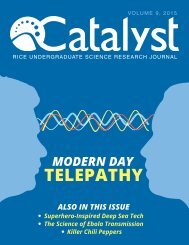[Catalyst 2016] Final
Create successful ePaper yourself
Turn your PDF publications into a flip-book with our unique Google optimized e-Paper software.
THE CHEMISTRY<br />
C<br />
oF COFFEE<br />
ollege students often rely on coffee<br />
to get them morning classes after<br />
sleep-deprived nights. This miracle<br />
property is attributed to caffeine, one of<br />
the most well-known and widely-consumed<br />
stimulants available. However, as coffee<br />
aficionados may tell you, coffee is more<br />
than just caffeine. There are dimensions<br />
of taste, smell, and aesthetics that define<br />
the world of coffee, and many of these<br />
are associated with its rich chemistry.<br />
Researchers have begun to delve into the<br />
mysterious world of coffee to explore the<br />
health consequences of its components.<br />
Much to the coffee lover’s relief, numerous<br />
studies published in the past decade<br />
detail the multitude of benefits of drinking<br />
coffee. 1,2 In May 2012, researchers from<br />
the American Heart Association found<br />
that habitual consumption of coffee<br />
was correlated with decreased risk of<br />
heart failure. 3 Just four months later,<br />
another study suggested that coffee may<br />
alleviate back, neck, and shoulder pains. 4<br />
Researchers at the Harvard School of<br />
Public Health found that coffee may protect<br />
against several types of cancer, including<br />
prostate cancer, 5 breast cancer, 6 and basal<br />
cell carcinoma. 7<br />
However, caffeine is not solely responsible<br />
for coffee’s apparent health benefits.<br />
Coffee contains thousands of different<br />
chemicals, many of them understudied or<br />
even undiscovered. Nevertheless, chemists<br />
have identified several chemical candidates<br />
that could be responsible for these health<br />
effects, including phenols, chlorogenic<br />
acids, and quinides, all of which act as<br />
oxidants. Diterpenoids in coffee may also<br />
raise good cholesterol and lower bad<br />
cholesterol. 1 Moreover, a 2008 study found<br />
that the smell of coffee beans alone could<br />
BY JAMES SIRIWONGSUP<br />
“A 2008 STUDY FOUND<br />
THAT THE SMELL OF<br />
COFFEE BEANS ALONE<br />
COULD BE LINKED TO<br />
STRESS RELIEF.”<br />
be linked to stress relief. 8 It is never too late<br />
for that last-minute exam cramming at a<br />
Starbucks!<br />
However, many of these findings are in<br />
their early stages; many of these studies<br />
are simply drawing correlations between<br />
habitual consumption of coffee and its<br />
influence on health outcomes. Until studies<br />
can demonstrate causational links between<br />
specific chemical compounds in coffee<br />
and their physiological interactions, we<br />
should not wholeheartedly embrace these<br />
conclusions. Still, the research is taking<br />
meaningful steps forward; for example,<br />
a study published in Neurobiology of<br />
Aging has linked a single molecule in<br />
coffee, eicosanoyl-5-hydroxytryptamine,<br />
to neuroprotective benefits in rats with<br />
Alzheimer’s Disease. 9 While it is still too<br />
early to say whether coffee can improve<br />
your health, coffee science dictates that a<br />
daily cup of coffee is never a bad thing.<br />
READ MORE BLOGS AT<br />
CATALYST.RICE.EDU<br />
works cited also online<br />
THE CASE FOR THE<br />
CAFFEINE CRAZE<br />
CATALYST 36


![[Catalyst 2016] Final](https://img.yumpu.com/55418546/39/500x640/catalyst-2016-final.jpg)

![[Rice Catalyst Issue 14]](https://img.yumpu.com/68409376/1/190x245/rice-catalyst-issue-14.jpg?quality=85)
![[Catalyst 2019]](https://documents.yumpu.com/000/063/794/452/bc6f5d9e58a52d450a33a2d11dbd6c2034aa64ef/47664257444a666654482f6248345756654a49424f513d3d/56424235705761514739457154654e585944724754413d3d.jpg?AWSAccessKeyId=AKIAICNEWSPSEKTJ5M3Q&Expires=1716483600&Signature=GxTIHDaImiwCLZHBW4nQY2TFXWQ%3D)
![[Catalyst Eureka Issue 2 2018]](https://img.yumpu.com/62125575/1/190x245/catalyst-eureka-issue-2-2018.jpg?quality=85)
![[Catalyst 2018]](https://img.yumpu.com/62125546/1/190x245/catalyst-2018.jpg?quality=85)
![[Catalyst Eureka Issue 1 2017]](https://img.yumpu.com/58449281/1/190x245/catalyst-eureka-issue-1-2017.jpg?quality=85)
![[Catalyst 2017]](https://img.yumpu.com/58449275/1/190x245/catalyst-2017.jpg?quality=85)
